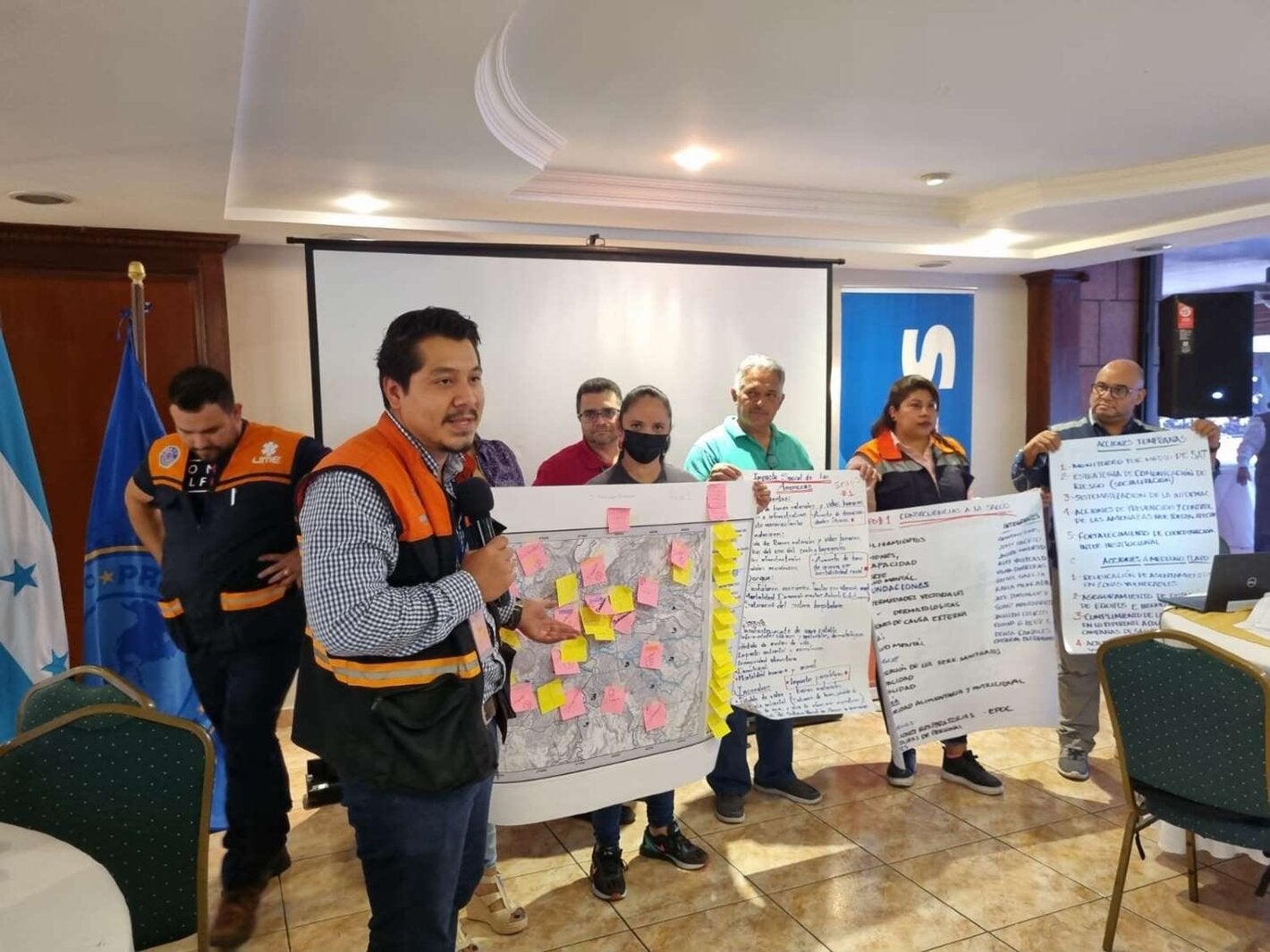
Tegucigalpa, Honduras. July 11, 2023. - The Secretariat of Health, with the technical and financial support of the Pan American Health Organization (PAHO/WHO), held a training on the use of the STAR tool (Strategic Tool for Risk Assessment of Emergencies and Disasters in Health Facilities) with a focus on Preparedness in Urban Environments, facilitated by PAHO/WHO experts and aimed at national authorities of the Ministry of Health, directors of departments and units at the national level, the Health Emergency and Disaster Risk Management team, COPECO, the Mayor's Office of Tegucigalpa, public institutions supporting health emergencies and other relevant stakeholders.
The expected results of this workshop, held from July 11 to 15, include the training of professionals in the application of the STAR tool, the assessment and diagnosis of preparedness, response and recovery capacities for health emergencies and disasters in different regions of Honduras and in the urban environment of Tegucigalpa, and the development of a roadmap for the implementation of the Framework to strengthen preparedness in cities and urban environments.
During the opening event, Dr. Nerza Paz, Vice Minister of Health Networks thanked PAHO/WHO for their technical and financial cooperation for this workshop, which prioritized the participation of the health regions of Atlántida, Cortés, El Paraíso, Santa Bárbara, Yoro and the Metropolitan of the Central District, regions that have suffered many hydro-meteorological events. The Vice-Minister encouraged the participants to train and respond when these events occur and to know how to counteract the consequences of disasters caused by natural hazards.
Dr. Amalia Ayala, PAHO/WHO Life Course in Health Services Advisor in Honduras congratulated "the Ministry of Health, for its leadership and agreement to carry out this workshop, and COPECO, for the initiative to conduct this activity together and strengthen the capacities of human resources in the health regions and COPECO offices in the prioritized departments, to better respond to multiple biological, hydrometeorological and social hazards".
Ayala also stated that the workshop will be of great benefit to Honduras, emphasizing that this articulated work would enrich the local level. Ayala also highlighted the fundamental role of the municipalities in the response and management of risk and contingencies in the country; the capacity to manage and make strategic alliances in the face of events, threats, or outbreaks, now with the STAR tool.
The Ministry of Health and PAHO/WHO reaffirm their commitment to strengthen preparedness and risk management in the Health Sector, working in a collaborative and multidisciplinary manner to protect the population and improve the capacity to respond to emergency situations. This workshop represents an important step in this process and lays the foundation for the construction of the Multi-Hazard Response Framework for the Health Sector.
Learn more
The Americas is a region highly affected by disasters caused by natural hazards, and Central America in particular has experienced numerous intense events that have caused significant damage and losses. With a total of 1,123 disasters recorded in Central America and 116 in Honduras from 1900 to June 2023, the need to assess and address risk as a fundamental part of strategic planning to reduce loss of life, damage to infrastructure and economic losses, especially in the Health Sector, is evident.
In this regard, PAHO has been working to strengthen knowledge of risk and improve the Health Sector's preparedness to support the countries of the region. Although almost half of the countries in the region already have national disaster risk reduction strategies, plans and policies in place, there is no objective assessment of the level of preparedness of the National Health Sector.
It is therefore essential to estimate the preparedness capacity at the national and subnational levels of the Health Sector to face natural, anthropogenic and health events that generate emergencies and disasters, as well as to evaluate the capacity for early recovery from the effects of these events. The Index of Preparedness for Emergencies and Disasters in Health (IPED) provides information on the degree of progress in preparedness with a multi-hazard approach.
Disaster risk assessment plays a key role in the management of health emergencies and disasters. It allows the nature and extent of risk to be determined by analyzing potential hazards and assessing existing conditions of exposure and vulnerability. This assessment provides a sound basis for proper planning and prioritization of efforts in prevention, mitigation, preparedness, response and recovery from emergencies and disasters.
It is in this context that the STAR tool is presented as a comprehensive set of tools that enables a strategic, rapid and evidence-based assessment of public health risks. The STAR methodology offers a comprehensive and user-friendly approach, enabling national and subnational governments to rapidly assess public health risks and to plan and prioritize health emergency and disaster management activities.
In Latin America and the Caribbean, where urbanization is a predominant phenomenon, it is essential to consider risks in urban settings. WHO has developed a Framework for Strengthening Health Emergency Preparedness in Cities and Urban Settings, recognizing the importance of this approach.
In this context, PAHO is committed to supporting the strengthening of preparedness, response and recovery capacities for health emergencies and disasters in cities and urban settings in Latin America and the Caribbean. In collaboration with the Secretariat of Health and other relevant institutions, this workshop is scheduled to focus on training personnel responsible for Health Sector Risk Management in the assessment of capacities and planning needs, as well as in the use of the STAR tool to identify hazards and determine priority risks.



